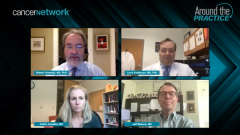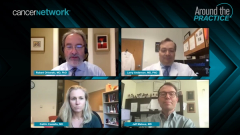
Triplet Vs Doublet Therapy for Transplant-Ineligible MM
Scenarios for which a doublet regimen may be recommended over a triplet therapy for the management of newly diagnosed transplant-ineligible multiple myeloma.
Episodes in this series

Robert Orlowski, MD, PhD: Let’s move to our next polling question, which touches on something that Jeff mentioned: triplets vs doublets. I guess we’ve let the cat out of the bag. We on the panel feel the triplets are probably the best thing, but let’s have all of you at home vote on whether you’d favor a doublet or a triplet. Larry, while folks are voting let me ask you, it seems that 1 of the concerns I still hear about using daratumumab as part of daratumumab-lenalidomide-dexamethasone up front for these patients is that folks like daratumumab so much, and it works so well in the relapsed setting that they want to save it for second-line therapy. What do you think about that strategy?
Larry Anderson, MD, PhD: You could also argue, especially in these older patients, that you want to put your best foot forward. Some of these patients may not get to second line, especially if they’re more informed. If you can get them on a good regimen up front that’s well tolerated and keep them in remission longer, that might be all they need. Certainly, you’ve got pomalidomide and other options as well, even if you don’t have the daratumumab left for later. One other consideration would be doing a couple of years of therapy if it’s someone who didn’t have superaggressive disease. If they relapse again, they would theoretically be sensitive to it again. I’m not too worried about using the daratumumab up front in these patients because we want to get them in a deeper remission and, hopefully, more durable response.
Robert Orlowski, MD, PhD: Caitlin, from the voting it looks like the majority of people are favoring a triplet, but there are some folks that like doublets. What kind of patients in this transplant-ineligible group would you think that a doublet might be very appropriate for?
Caitlin Costello, MD: We have enough survival data out there of triplet vs doublet to tell us that 3 drugs matters. I’d have to have a good reason to not give someone 3 drugs. I could come up with a scenario in my mind where I had an older, frail, bed-bound, housebound patient who had solely pill options. If I had to come up with something that was all oral options, financial toxicity is a big 1. Because if you’re looking for triplets that are all oral, that’s a lot of expense. If you tried to do it and, for example, lenalidomide for the newly diagnosed transplant-ineligible patient, they may not have the capability of paying for it from Medicare donut holes or coming in for regular blood toxicity assessment. I could imagine a scenario where a doublet may have a role, but we have enough data to tell us now that triplets are just the appropriate approach.
Robert Orlowski, MD, PhD: Jeff, what do you think? Sometimes we run into folks who have had lots of thromboembolic complications and we worry about doing an IMiD [immunomodulatory imide drug] and a steroid. Would you do something like bortezomib-dexamethasone in that kind of patient, or would you think about CyBorD [cyclophosphamide, bortezomib, dexamethasone] in a transplant-ineligible patient like that?
Jeff Matous, MD: With a thrombotic history, it depends if they’re on anticoagulation risk. If I can safely anticoagulate the patient, then I have no problem using an immunomodulatory drug. Getting back to the doublet and triplet question, we should make every effort to get a triplet into people, but there are patients who are going to get doublets. Some of us who see myeloma all the time, don’t see frail patients who are 85 or 90 or 95 years old. We tend not to see those patients. Typically, if patients can come to see us, they’re probably triplet eligible. I’d be curious to hear from the audience which patients, maybe later we can touch on this, are candidates in their opinions for doublet therapy.
Robert Orlowski, MD, PhD: Sounds great. Larry, how do you factor in frontline therapy? How does it impact the options and choices for maintenance and later lines of therapy?
Larry Anderson, MD, PhD: It depends on what you use for the front line. If you’re using a tolerable regimen, we can potentially keep them on that for maintenance, like a monthly injection for daratumumab. Trying to keep them on therapy would often reduce the IMiD after awhile just to be able to stay on it. Often we’ll get rid of, or at least reduce, some of the steroids after a year or so to help keep these patients on treatment without too much toxicity. Certainly, it depends on when they relapse, what they’re on at the time, and how long it’s been since a previous regimen. If they’re relapsing on a certain class, then you’d want to switch classes at relapse, or switch 1 of the drugs if not both. It also depends on how bad their cytopenia is. If they’re having trouble tolerating IMiDs altogether, you might completely switch drugs. If they’re tolerating it well and just having a slow biochemical relapse, you might consider switching out a drug in the same class. Sometimes it can get some mileage out of that as well.
Transcript edited for clarity.
Newsletter
Stay up to date on recent advances in the multidisciplinary approach to cancer.








































